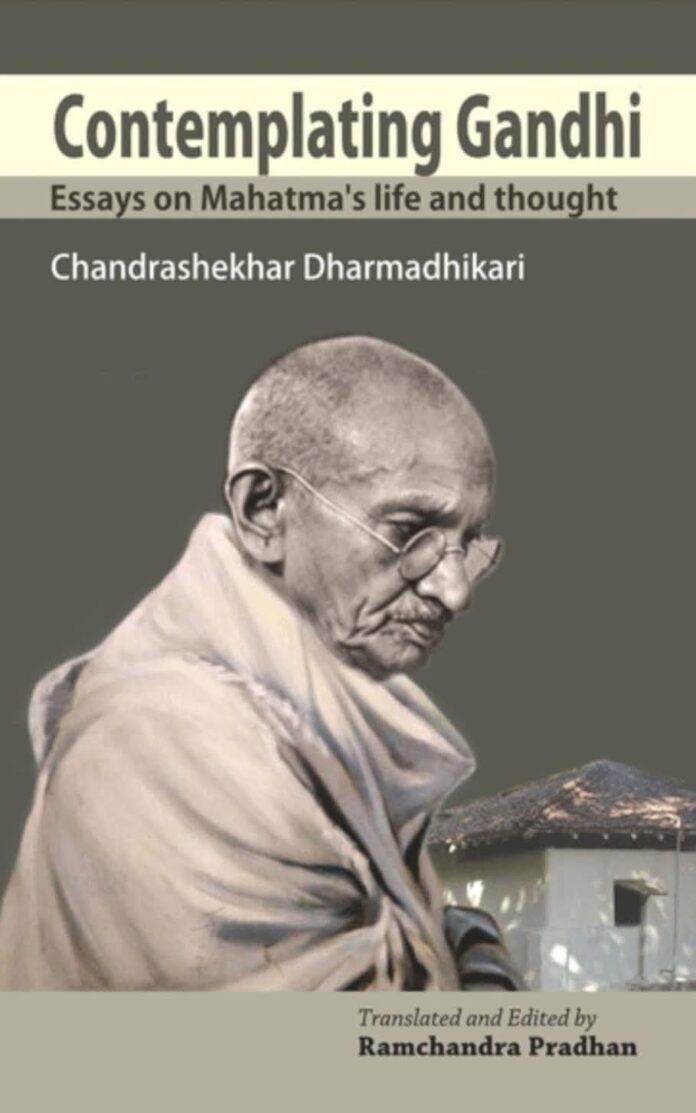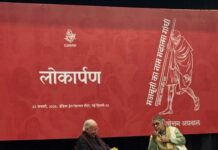— Shaleen Kumar Singh —
In Contemplating Gandhi: Essays on Mahatma’s Life and Thought, Chandrashekhar Dharmadhikari, a notable jurist and Gandhian thinker, presents a deeply reflective and insightful account of the Mahatma’s life, philosophy, and enduring significance. The essays, thoughtfully compiled and expertly translated by Ramchandra Pradhan, present an intimate and vivid portrayal of Gandhi, seamlessly mixing historical insights with poignant personal reminiscences. This volume transcends the bounds of academic discourse, becoming a heartfelt and reverent tribute to a legacy that continues to inspire and guide generations, both past and present.
Ramchandra Pradhan’s preface is a heartfelt and expansive memoir detailing his serendipitous and deep association with Justice Chandrashekhar Dharmadhikari and the Institute of Gandhian Studies in Wardha. Through his reflective and eloquent writing, Pradhan reveals a deep and abiding respect for Dharmadhikari’s unwavering dedication to Gandhian values and principles. Pradhan’s preface is not merely an introductory passage; rather, it chronicles his decade-long journey of engaging with Gandhian thought, a journey characterized by mutual affection, intellectual camaraderie, and a shared reverence for the Mahatma’s enduring legacy.
Pradhan affectionately recounts Dharmadhikari’s poignant anecdotes, including the inspiring words spoken by Dharmadhikari’s mother to his father, Dada Dharmadhikari, during the pivotal Non-cooperation Movement. Such compelling narratives serve to enrich the book’s historical context, offering readers a valuable glimpse into the familial and philosophical underpinnings that have so profoundly shaped Dharmadhikari’s own work and perspective. Moreover, Pradhan’s translation, which Dharmadhikari himself has described as enhancing the original text, underscores Pradhan’s vital role in preserving the nuances and essence of Gandhian philosophy for a contemporary audience.
The essays of this collection, written on various occasions, range from reflections on Gandhi’s principles to portraits of significant figures in the Gandhian movement, including Jamnalal Bajaj’s wife, Jankidevi. They explore themes like the Non-cooperation Movement, the challenges of India’s independence, and Gandhi’s response to partition. While Dharmadhikari’s writings exhibit repetition, as acknowledged by the translator, this reiteration reinforces the profundity and timelessness of Gandhian ideas.
Dharmadhikari emphasizes the dynamic nature of Gandhian philosophy. Drawing on his father’s wisdom, he argues that ideas must evolve with the times to remain relevant. This approach challenges readers to engage critically with Gandhi’s teachings, urging them to reinterpret his principles in contemporary contexts.
The book’s philosophical core lies in Dharmadhikari’s insightful and nuanced reflections on the profound concepts of Anasakti Yoga and Karma Yoga, which Gandhi himself so eloquently embodied and exemplified throughout his life. These essays also powerfully highlight Gandhi’s unwavering humanism, his inspiring ability to transcend personal sorrow during times of immense national crisis, and his steadfast commitment to living amidst and in service of the people.
Dharmadhikari’s deeply personal recollections and experiences with the Mahatma himself, such as the cherished moments of walking alongside Gandhi and the profound anguish of mourning his tragic assassination, add an indelible emotional dimension to the essays. These poignant accounts elevate the book from a mere academic endeavour, transforming it into a living, breathing bridge that connects the revered past with the present day, allowing readers to forge a genuine, visceral connection to Gandhi’s enduring legacy.
Hence the book titled ‘Contemplating Gandhi’ is not merely a collection of essays; rather, it is a profound philosophical exploration and a heartfelt, reverent homage to the life and enduring legacy of the Mahatma. Through the insightful writings of Chandrashekhar Dharmadhikari, enriched by the meticulous and evocative translation of Ramchandra Pradhan, this volume inspires readers to view Gandhi’s teachings not as relics of the past, but as a living, dynamic philosophy that continues to guide and shape the present-day world.
This book is an necessary read for scholars, students, and anyone deeply interested in Gandhian thought and principles. It challenges readers to think critically, to embrace the fluid and evolving interpretations of Gandhi’s ideas, and to strive to embody his timeless values and principles in their own lives. Through this reflective work, Dharmadhikari and Pradhan remind us that the true relevance of Gandhi’s legacy lies not in the provision of ready-made solutions, but in the offering of a transformative framework for ethical, purposeful, and meaningful living in an ever-changing, dynamic global landscape. A book that deserves serious reading.
Discover more from समता मार्ग
Subscribe to get the latest posts sent to your email.

















